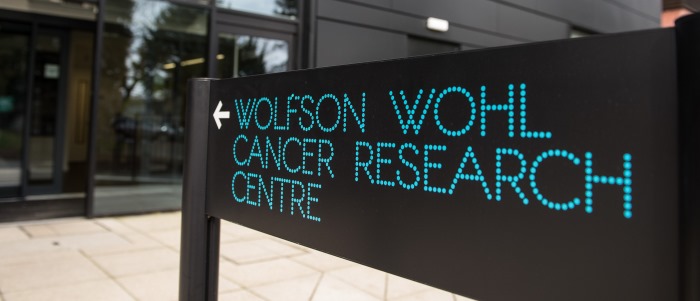
UofG announces research collaboration with Lilly to discover potential new drug targets
Mon, 15 Feb 2021 00:01:57 GMT

UofG-led arthritis research centre creates new generation of scientists
Mon, 12 Oct 2020 00:00:00 BST
Recent funding
- Glasgow RadNet Radiation Centre of Excellence; Cancer Research UK, £503k (2023-24).
- Investigating the tumour microenvironment of high risk localised prostate cancer to identify actionable pathways involved in cancer progression; Prostate Cancer UK, £1.5 million (2023-2028).
- Integrated Technologies for Improved Polyp Surveillance (INCISE) V2.0; Innovate UK, £1.2million (2023-5).
- Caring for Long COVID in primary care: Using patient and professional experience to build codesigned solutions; Office of the Chief
Scientific Adviser, £298k (2023-25). - ENDOSCOP: Establishing Neuronal Drivers and the Spinal Circuitry of Osteoarthritis Pain; Wellcome Trust, £1.1million (2023-2031).
- HIPPOCRATES; European Commission, £41k (2023-26).
Research news
- Glasgow scientists working to develop new immunotherapy for breast cancer
- Iron test could improve outcomes for heart patients
- New Scottish study to "REACH" people with heart failure at home
- Identifying frailty should be a routine part of Diabetes care
- UofG researchers report how novel diabetes drugs work to improve the prognosis for patients with heart failure
- Scientists develop new 'precision medicine' approach to treating damaged DNA in pancreatic cancer
Scotland has a high incidence of chronic disease. There are rising numbers of people living with multiple long-term disorders, impacting on quality of life and increasing costs to the NHS.
The University’s Clinical Innovation Zone at the Queen Elizabeth University Hospital (QEUH) campus is now Scotland’s focal point for the implementation of precision medicine. The Zone is home to the Precision Medicine Scotland Innovation Centre (PMS-IC, formerly the Stratified Medicine Scotland Innovation Centre).
Precision Medicine is an approach which enables doctors and researchers to identify and develop treatments that are effective for particular groups of patients, using advanced genomic, imaging and information technologies. Precision medicine will ensure that the right patient gets the right treatment at the right time, and will provide safer and more cost-effective treatments.
Partnering with NHS Greater Glasgow & Clyde, the University of Glasgow has driven Scotland’s vision in precision medicine, including the development of over £80m infrastructure to support precision medicine clinical trials at the QEUH. Our £32m Imaging Centre of Excellence (ICE) includes Scotland’s only 7 Tesla MRI scanner, an ultra-high resolution scanner, which is the first of its kind fully integrated within a clinical site in the UK. ICE will drive the development of imaging technology to understand and benefit diseases such as stroke, brain tumours and multiple sclerosis.
The University is one of Innovate UK’s Precision Medicine Centres of Excellence and our ambition is to be a global centre of excellence for chronic disease, precision medicine and imaging. Capitalising on our investment in infrastructure and biomedical researchers to drive international research excellence and patient benefits, and deliver economic benefit for Scotland and the UK.
Meet our academic ambassadors
- Professor Dame Anna Dominiczak
- Professor Jeff Evans
- Professor Frances Mair
- Professor Iain McInnes
- Professor Rhian Touyz
Supporting the United Nations Sustainable Development Goals:

Find out more: Sustainable Development Goals
















